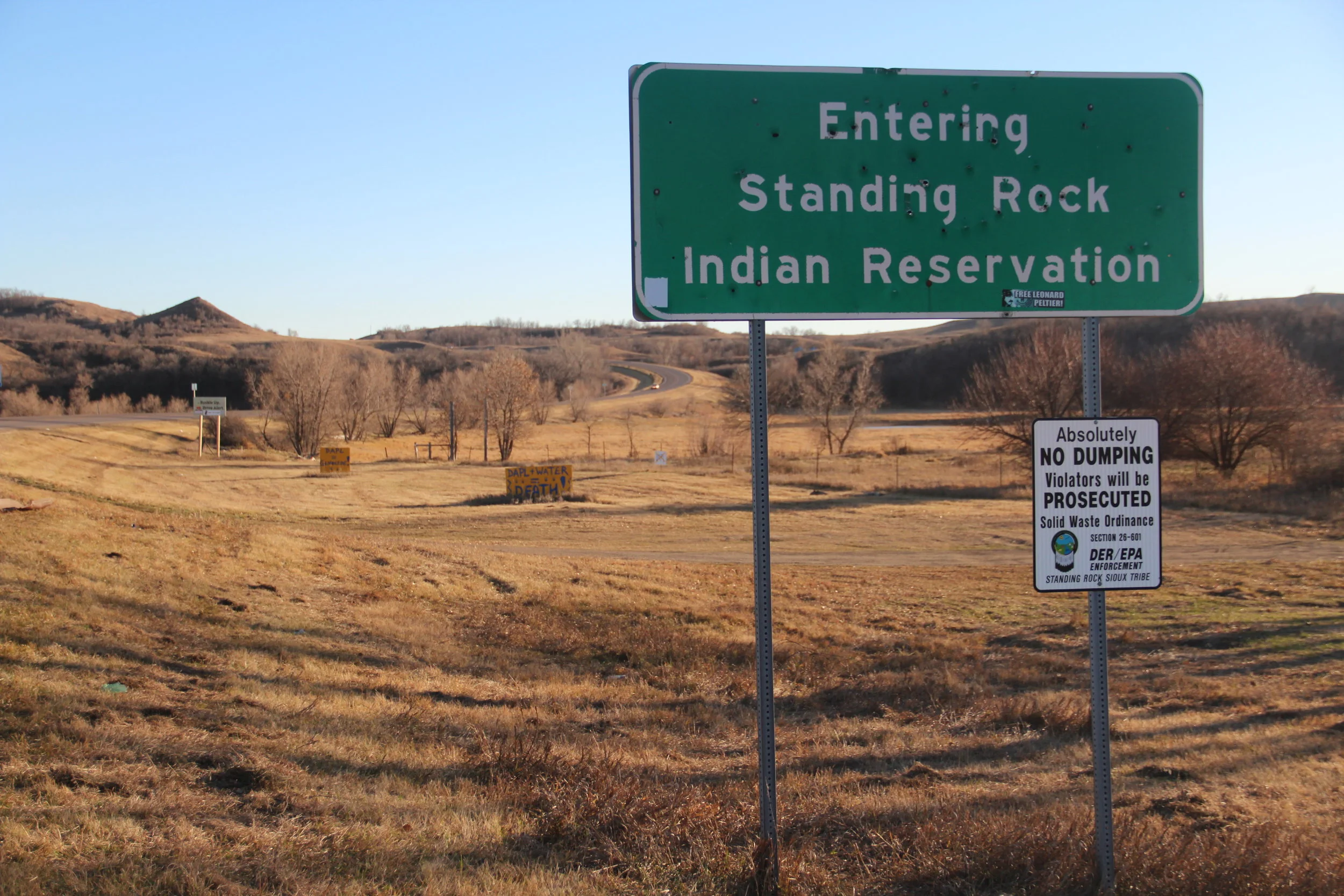Standing Rock descends on the White House with sage and ceremony
/It's true, what they say: You get used to being cold. It doesn't take all that long, either. One month on the prairie and I barely noticed I was shivering all the time in the constant sodden chill; I was used to the dull ache in my throat and eyes as my sinuses clogged and unclogged, used to never getting fully undressed, to changing one bit of clothing at a time, hiding under blankets.
It was only fitting that the Native Nations Rise March took place on a freezing, blustery wet day in Washington DC, when just the day before the temperature had neared the seventies. It was as if the tribes who had flooded the capital en masse, arriving by bus and carpooled ride, by plane and train and truck, had dragged the wind-whipped prairie to the Capital with them, perhaps to accentuate the profundity and raw elemental nature of the struggle they faced at Standing Rock. The cold has never deterred the resilience of the First Nations people to fight for the Earth, and it did not this day in Washington, either.
Over 5,000 Native Americans and their allies showed up to walk down the road to the white house, beating drums and dancing and burning bundles of sage. The air was filled with smoke, and with song, prayer, and chants:
"You can't drink oil; keep it in the soil!"
"We exist! We resist! We rise!"
And of course, always, "Mni Wiconi!" Water is life.
As we made our way to the National Mall, I glanced up at the suited men and women peering out the windows of the high rises, small groups of them gathered to watch the long train of people march by with our banners and drums and the puppet of the black snake, which weaved through the crowd held aloft on several sticks. I wondered what the people up in those windows were thinking, and if they always stared like that when there was a demonstration taking place, or if there was something special about this one. Something exotic and otherized in the bright colors and burning bundles of herbs.
The way they stood, gawking, made me think about how this country has always treated Native Americans: fetishizing their clothing, culture and looks, bestowing the pigeon-holing archetypes of the "Noble Savage," and at the same time stripping their basic human dignities and long-written land treaties, subjecting them to literally hundreds of years of systematic environmental racism.
Photo by Jacq Williams.
I thought about how this march, the people who braved the prairie winter, this whole long and harrowing fight, was about violently forcing Native Americans to accept something that was deemed too dangerous for white people. I can't stop coming back to that, through all of this.
We marched.
We marched to Trump Tower, where on the front lawn the Sioux erected a teepee, and small groups of women danced, while the men drummed and prayed as they symbolically reclaimed the stolen land of their people. I stood on a bench to see protectors snaking around blocks in either directions, dozens of tribes represented, thousands of flushed and sniffling faces who came streaming into the streets from the warm comfort of their lives to stand up for the sacred. Just as they had done at Standing Rock.
I was starting to run into more and more people I knew from camp, people we fed in the kitchen, people who taught me songs and told me secrets, and who came into our yurt at night looking to swap histories. I hugged and laughed with people I was desperate to see again, children and the women who herded them down the slippery hills at camp, the head of security, and the people who built the school among them. I knew half of them had ridden buses for days to be here. Their faces made me ache to be back on the prairie, where we interacted in such an unadulterated and archaic way, never buried in our phones or dogged down by the necessity of exchanging dollars with one another. We learned more about each other than best friends know, having to be present and integral in one another's lives from the very beginning. Having no other choice but to work together.
We marched on, to the front gates of the White House, where I doubted the President cared enough to glance out of the window, had he been there at all.
It's a strange feeling, resisting in such a forthright and visual way, fighting for what you know is your life and the lives of your children's children, and knowing the lawmakers and lobbyists of this country have the option to just look away. The people in power, and the people at home, who don't visit news sources which would even cover something like this march, can still doze in comfort while we scream in the face of willful ignorance.
Photo by Jacq Williams.
The Water Protectors gathered at the White House fence, chanted and held banners, and were told to get off of the sidewalk by the police and secret service, over and over again. We took pictures and burned more sage, and some people called out to the police: "Join us! Your grandchildren need clean water, too!" They were met with the blank stares of unabashed indifference. To them we were merely a possible security threat, to be assessed, addressed, dismissed.
My small group broke off and made it to the rally on the lawn. We hung around the outskirts, and were glad we did, as Dave Archambault's voice was the one we soon heard over the surrounding speakers. DAPL Dave, as he is called, is the Chairman of the Standing Rock Sioux Tribe, and it is widely believed that he made a deal with Energy Transfer Partners and the BIA to dismantle the camps—even those on the private property of Ladonna Allard—and essentially smooth the way for the pipeline's completion.
Those who didn't know about this cheered him as his spoke his message of unity. Those who did, like Ladonna's daughter, Prairie, stood in the back and shouted their discontent. I felt the splintering, just like I had at camp, of the reality of the situation versus the perception.
The reality, I have come to understand, is that we were never going to stop a 3 billion dollar pipeline from being completed. Not in a capitalist society which places the monetary value of commodity over life in all its forms. We were there operating under the perception, the hopeful belief, that the will of millions of Americans and the thousands of people who showed up to represent them, were enough to convince the world that the sanctity of our Native Tribes— their sacred land and their drinking water—are of more value than another faulty pipeline meant to carry oil which wouldn't even be used for American consumption. Essentially, that water/life was more important than oil/money.
We were wrong. Despite the best of our efforts, the black snake has been built and will carry highly volatile fracked oil as early as next week.
But that doesn't mean that it was futile to gather on the prairie or flood the streets of Washington. All else aside, I don't know one person who returned home from the protest in North Dakota without a profound sense of purpose and empowerment, and a deeper understanding of the intersectionality of our resistance. Knowing, down to our marrow, that while we shout for the water we are also shouting for racial equality, environmental justice, and the reconfiguring of an economic system which keeps defense contractors buying islands while children starve on our own soil.
Gathering like this, making camp and forming community in the face of capitalist greed, flooding the streets of Washington in winter, are in themselves acts of profound defiance. Going back to our own lives with the seeds we took from these gatherings, and planting, cultivating, and redistributing the crop amongst ourselves— that is an act of revolution. To reconfigure a pyramid-shaped system which has forever only benefitted the top, we need people on the ground who have already chosen to live a different way, who are willing to drop everything to come together in rejection of this wildly inequitable structure, to break down the pyramid and use the stones to build well-trodden paths from house to house.
Standing Rock, and the Native Nations Rise March on DC, have proven that we have those people. That we are willing to brave the elements and our own self-doubt in order to return to a more harmonious, communal, sacred way of life, and that our numbers are growing. The truth is this: among the sleeping souls of complacency, there is an awakening of warriors for a new world who are ready to resist, and to re-imagine. At a moment's notice, ready to rise.
Jacq Williams is a freelance writer, homesteader, and activist from Southeast Michigan who spent several weeks at Sacred Stone Camp in Standing Rock in the fall and winter of 2016. She is currently working on an advocacy project for pregnant women in prison and transitional housing, called the Inmate Birth and Infancy Project.












